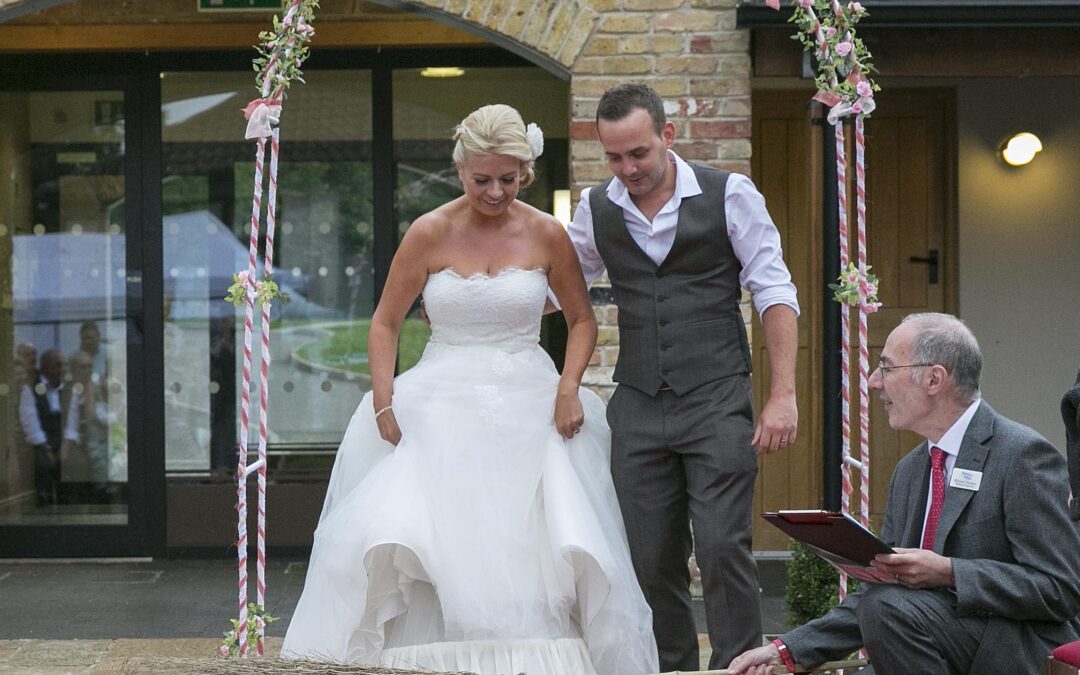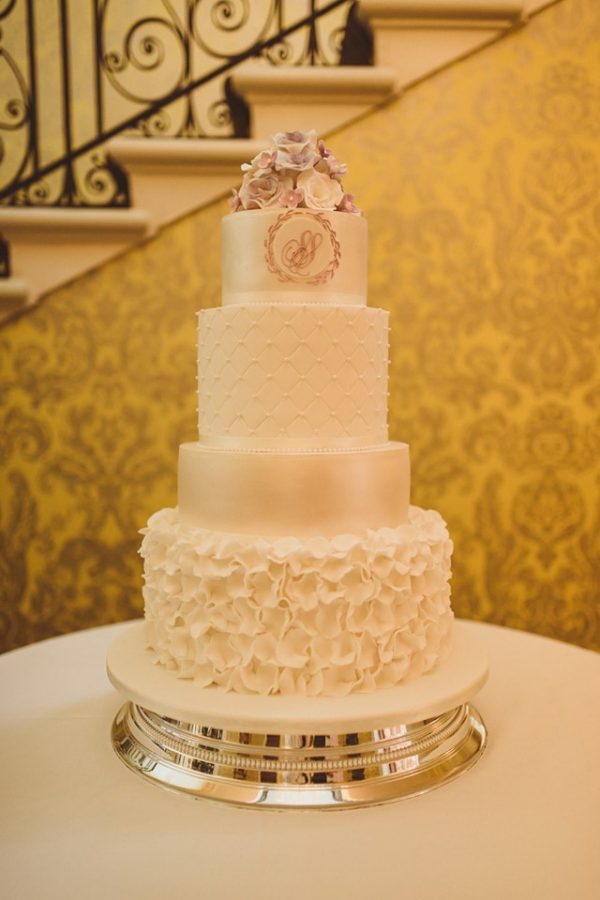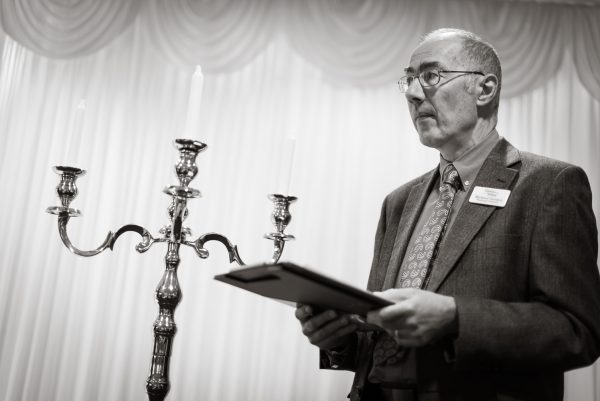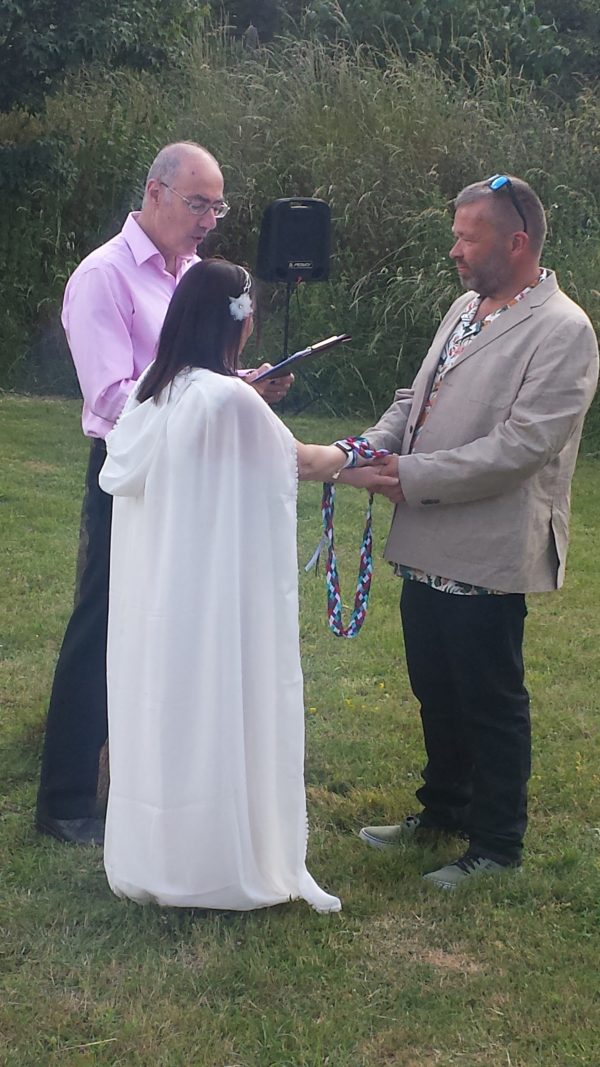
by Michael | Oct 4, 2021 | Blog
Most people don’t really know what a civil celebrant can offer or why they should investigate using one.
A fallacy is that a celebrant is the same as a registrar. Although a proposal to change things so a celebrant’s ceremony can be legal too is going through parliament at present, the roles are still separate.
A registrar is a civil servant, who is employed by the government to ensure that all the legal bits are carried out to make each marriage valid. Their ceremony normally takes a quarter of an hour or so, and is standardised. So each couple gets more or less the same as the one before, or the next one. What’s more, the service may not contain a single religious word or even mention God.
Given that the registrar’s ceremony is mandatory, why should you bother with a celebrant ceremony too?
The fact that the celebrant is independent is worth a great deal. It means that, once you have been legally married (by the registrar), you are free to have the ceremony of your dreams in the place of your dreams.
If you want some religious items, you can do so; if you want to write your own vows, you are welcome to; if you want a mention of absent friends, not an issue; if you want to talk about how the two of you met – or what is keeping you together – then that’s great!
You can have a mix of solemnity and humour. You can have a unique ceremony, maybe including a ritual or two (such as the Loving Cup or a handfasting), and you can tailor your ceremony so that others can participate.
In short, the ceremony can reflect your personalities and beliefs, and be everything you want it to be.
But only with a celebrant.
Of course, there are many celebrants out there, and each has their own USP. So you need to speak to, if not meet, one or two (eliminating some, once you’ve looked at their websites).
Online reviews are a good starting point. Then you can see if the celebrant is likely to understand and run with your vision of the ceremony.
Your budget is not as important as feeling the person is right for you. (You can usually tinker a bit and save some money elsewhere, if the celebrant is a bit dearer than you had planned.)
As well as showing professionalism, albeit in a likeable way, the celebrant should have great presentation skills.
They should be able to create a wonderful personalised ceremony that is beautifully delivered on the day. They need to be able to work hand-in-hand with you to achieve this.
Michael would be glad to have a (non-obligation) call with you to discuss how he can help guide you to your dream ceremony.
Photo: Soody Ahmed

by Michael | Dec 9, 2020 | Blog
Legal matters concerning marriage may not be everyone’s cup of tea. Indeed, the title possibly did not grab your attention. But you can’t marry without certain requirements being satisfied, so please read on.
Exciting news
There is every possibility that, in the course of 2021 or 2022, the law will change. If so, independent civil celebrants will be permitted to train and conduct legal ceremonies. Then you can have the ceremony of your choice and it will be legally binding.
Obviously, churches and register offices will not stop acting as marriage venue possibilities.
Incidentally, as far as legal registration is concerned, this blog only covers births, deaths and weddings. (You don’t need any paperwork to celebrate a Vow Renewal or a handfasting.)
The current situation
Births are usually registered at a hospital. For deaths, the doctor (either at home or, again, at the hospital) normally provides the death certificate, which you take to the local Register Office.
Until such time as the legislation changes, here is what you have to do at the moment for a legal wedding. It’s a little more complex.
Religious weddings
If the wedding is conducted in an Anglican church or synagogue, or according to the Quaker service, then there is normally a member of the institution present who is a registrar. They will ensure the legalities are carried out.
If you’re having a marriage anywhere else, things are different and a little more complicated!
Register Office
You need to register your intention to marry at least 28 days in advance. Then you go to the Register Office (by appointment) with two witnesses, and can get legally married. The ceremony will be totally secular and fairly standardised (so next-to-nothing to differentiate one service from the next).
The Registrars used to be able to come to you. Legislation is going to change for this too, but for now, provided the wedding venue has four solid walls and a roof (basically), the registrars could conduct the wedding for you at your venue. (This would cost several hundred pounds more than attending the Register Office.)
However, due to the Coronavirus situation, registrars are not coming out to venues at all for the foreseeable future.
Another alternative
You can have a civil celebrant-led ceremony. This lets you choose a religious (or partially-religious) or a secular ceremony. The big thing – setting this option out from the other two – is that you can have the ceremony of your dreams. Why? Because the celebrant will work with you in advance to respect and enable your vision. It’s all about personalising, rather than following a standard rubric. That means your ceremony will be unique, and can reflect your personalities and beliefs.
The downside is that the ceremony has no legal validity. So you still have to attend the Registrar-led ceremony beforehand too.
Obviously, another downside – with all these – is social distancing, and the need to severely limit your guest list.
Either way, once you’re legally married, you can have your dream ceremony, conducted by the celebrant, afterwards. To all intents and purposes, that will be your real wedding!
Hopefully, not so painful, was it? But if you have any questions, please feel free to ask me.
Photo: Matt Penberthy

by Michael | Jan 20, 2020 | Blog
You’re getting married? Brilliant! Have you decided who will officiate? Will it be a priest (or equivalent), a registrar or a civil celebrant? Did you even realise that you have a choice?!
[This post is designed for English or Welsh couples, although laws are set to change in the not-too-distant future. Separate rules apply to Scotland and Ireland.]
Religion
If you are
marrying in an Anglican church, this is as simple as it gets. You will be able
to combine religious and legal in one ceremony. The same applies for Jewish and
Quaker weddings.
Otherwise,
you will have to arrange a trip to the register office and to the church before
you can be declared married.
Registrars
The registrars come at the other end of the spectrum to priests, although both services are pretty much standardised. The registrars are not permitted even to mention God or religion. What they do, however, is to pronounce the legal words. Without these being uttered and witnessed, no marriage is valid.
You need to make an appointment with the registrars and go to their office with two witnesses. Or the registrars may come to the venue of your choice (currently, there are restrictions, such as a minimum requirement of four solid walls). Be aware that this will cost you substantially more.
The registrars will offer you a minimum of choice as to the service structure. And their presentation skills can vary wildly!
Celebrants
Until the law changes, civil celebrants cannot marry people legally. They can bless them, conduct a part-religious (or even wholly-religious) service, hand-fast them, get them to sign a marriage certificate afterwards, but none of this makes the marriage legal.
So what
normally happens in these cases is that the couple marries first (at the register
office, unless the registrars come out to their venue). This can be done in a
private room or in front of guests.
When the registrars have left, the civil celebrant can stand up and publicly conduct the personalised ceremony the couple have been dreaming of. It may be religious, or partly so; it may be (partly) humorous; it may contain ritual; active participation may be invited; favourite readings or music may be chosen; it may well be unique to the couple.
At the end, the celebrant may declare the couple legally married (as long as the registrar service has been completed!).
The point is that, by using a celebrant, you have free choice as to the tone and content of your ceremony on your big day.
If you want
any further clarification on this issue, please feel free to contact me.

by Michael | Oct 21, 2019 | Blog
Yum! You’ll
be licking your lips at the prospect of this blog, after reading the title!
Well, I’ll
try and keep it light, but it’s an important area.
As far as legal registration is concerned, we’re only talking about births, deaths and weddings. You don’t need any paperwork to celebrate a Vow Renewal or handfasting.
With births,
the registration is almost always done at the hospital (although I realise that
not everybody has their baby there). For deaths, the doctor (either at home or,
again, at the hospital) usually provides the death certificate, and you take it
to the local Register Office.
With
weddings it’s a little more complex.
Religious weddings
If the wedding is conducted in an Anglican church or synagogue, or according to the Quaker service, then there is normally a member of the church (etc.) present who is a registrar. They will ensure the legalities are carried out.
If you’re
having a marriage anywhere else, then things are different. That’s where it
gets more complicated!
Register Office
You need to register your intention to marry at least 28 days in advance. Then you go to the Register Office (by appointment) with two witnesses, and can get legally married. The ceremony will be totally secular and fairly standardised (so next-to-nothing to differentiate one service from the next).
You don’t necessarily have to go to the Register Office. Legislation is going to change, but for now, provided the wedding venue has four solid walls and a roof (basically), the registrars can come out to the venue and conduct the wedding for you there. (This will cost several hundred pounds more than attending the Register Office.)
Another alternative
You can have a civil celebrant-led ceremony. This may allow you a religious (or partially-religious) or a secular ceremony – but the choice is ultimately yours. The big thing – setting this option out from the other two – is that you can have the ceremony of your dreams. Why? Because the celebrant should work with you in advance to respect and enable your vision. It’s all about personalising, rather than following a standard rubric. That means your ceremony will be unique, and can reflect your personalities and beliefs.
The downside
is that (again, there is new legislation in the air for England & Wales)
currently a civil celebrant’s ceremony has no legal validity. So you still have
to have the Registrar-led ceremony (either in their office or at your chosen
venue, if it’s suitable) in addition.
Either way,
once you’re legally married, you can have the dream ceremony, conducted by the
celebrant, afterwards. To all intents and purposes, that will be your real
wedding!
Hopefully, not so painful, was it? But if you have any questions, please feel free to ask me.
Photo: Matt Penberthy

by Michael | Jan 28, 2019 | Blog
In my role as a civil celebrant, I meet a lot of people who have been fed myths about marriage options . My goal is to bust at least a few of them!
Myth no. 1
“You can
only marry in a church (or equivalent) or a register office.”
There are
actually three ways you can marry.
Firstly, through your church or synagogue etc. You will have a full religious ceremony, which will include the legal bits. There isn’t much opportunity for personalising the ceremony, though.
Secondly, through your Register Office. This ceremony will not include any religious references, let alone the name of God. Like the religious ceremony, it will not be very personal to you (if at all).
The Registrars will come out to a chosen venue, if you want – but this comes at quite a financial cost!
The third option is to use a civil celebrant. This ceremony can be totally unique to you, but it will not be legal. Usually, couples get legally married by the Registrar and then move on to have the ceremony of their dreams in front of their chosen guests, which the celebrant writes and conducts.
Myth no. 2
“You have to
marry in church or at the Register Office.”
Although
these options are of course available, as I have suggested above, these are not
the only possibilities. You can marry where you like (subject to payment,
permission or agreement!).
At present, the registrars will come out and conduct their ceremony anywhere, so long as there are four solid walls. (They charge quite a bit for this, as I have indicated.) Legislation may change to allow them to perform marriages in the open air too, but this is as yet uncertain.
At present, a civil celebrant can conduct a service anywhere, indoors or outdoors. The venue can vary considerably: I have officiated at the Savoy, Stonehenge, on an exposed hilltop with fabulous views, at a canal-side sanctuary, in a (glorious) back garden – and the list goes on! You are limited only by your imagination.
Myth No. 3
“You need to
take out a mortgage just to afford a wedding.”
Depending on the budget you have in mind, this may indeed not be a myth! However, as I suggest in a number of my blogs, there are ways to save money – eg https://vowsthatwow.co.uk/marriage-costs/
Obvious ways include reducing the guest list and choosing a modest venue. You can also save money by marrying out of season and even in the afternoon and midweek. Please glance through some of my suggestions.
A lot of people want to be married by a celebrant. They know they can’t dispense with the legal ceremony, and then realise they have to pay the Registrars and the Celebrant too. There is a way round this.
Go (by appointment) to the Register Office before the appointed wedding day (hours or even days before). Go with two witnesses, and you will be legally married. This will cost much less than paying the Registrars to come to your venue. The savings you make can go on hiring a celebrant for your tailor-made ceremony!
So you actually
have a lot more choice than you may have realised!
I hope this has been useful in pointing out what may not be obvious. If you have any enquiries, then do contact me. If you know of any other myths that need clarification, let me know and I’ll be glad not to have to think up another subject for a blog!




